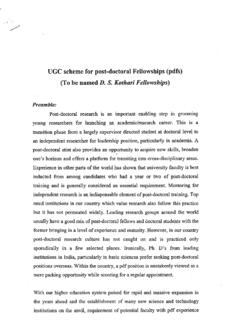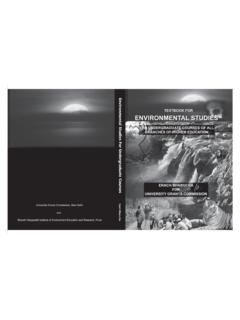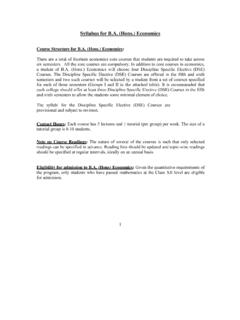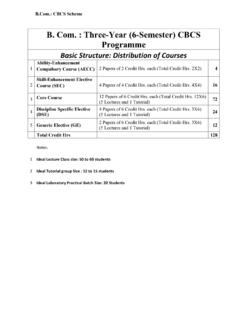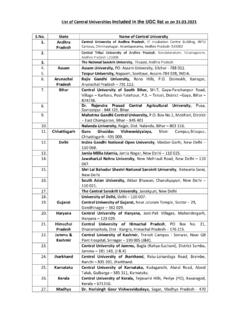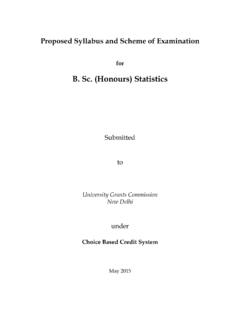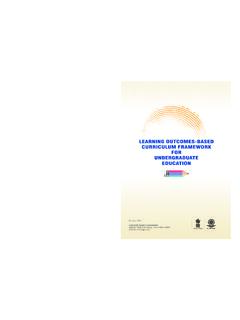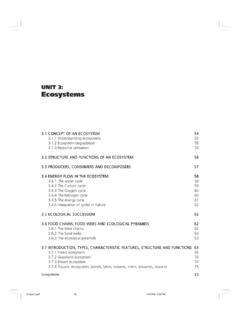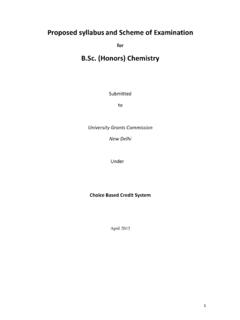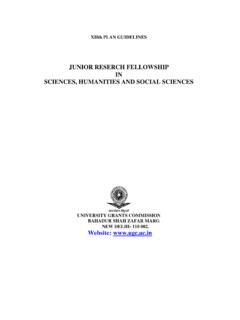Transcription of UNIVERSITY GRANTS COMMISSION Faculty Induction …
1 1 UNIVERSITY GRANTS COMMISSION Faculty Induction Programme(FIP) Framework 1. Context Teaching is an ethically and intellectually demanding profession. New teachers need rigorous preparation and opportunities for continuous professional development along with academic and professional support. Unlike teachers in school education, Faculty in higher education usually join the teaching profession without any formal training in teaching, learning or assessment. Understanding and capabilities in these areas along with awareness of policies, governance and administrative structures are developed informally out of their own experiences or from experiences shared by colleagues. One of the mandates set by the UNIVERSITY GRANTS COMMISSION is the development and implementation of a high quality Faculty Induction Programme for newly recruited Faculty in higher education institutions.
2 This can help new teachers to improve their teaching and management skills, adjust to the culture of higher education institutions, and better understand their professional responsibilities. The COMMISSION has designed a formal, systematic Faculty Induction Programme for transition of new teachers into the teaching profession. 2. Objectives The Faculty Induction Programme aims to help new teachers: a. Understand their roles and responsibilities as Faculty members b. Familiarize themselves with the structure, functioning, governance, rules, regulations and professional expectations in higher education institutions c. Explore pedagogical processes - aims of higher education, curriculum, instructional planning, classroom management and transaction, use of resources and assessment d. Recognise the importance of self-development, socio-emotional development of students and the importance of nurturing ethics and values in higher education 3.
3 Guidelines a. It is mandatory for all newly recruited Faculty members to go through the Faculty Induction Programme within one year of their joining service. 2 b. The one-month Programme will be done in two phases of 18 days and 12 days, respectively. It is envisaged as a residential programme. c. Implementing the Faculty Induction Programme will be the responsibility of the HRDCs. d. The pedagogy used in the Induction Programme should reflect participant-centred, inclusive, outcome-based, active learning with apt use of technology. Approaches that new teachers are being encouraged to use should be demonstrated during the Induction Program as well. e. The pedagogy of the Programme will be based on a combination of peer-facilitated, expert-led, and self-learning processes. o Discussions, debate and group reflection will be the basis of in-class sessions.
4 O Connecting key concepts and ideas to the everyday of the classroom will be central to the pedagogy of this programme. o Participants will be actively encouraged to reflect on and share their own understanding, questions, practice and experience. o Collaborative learning methods ( jigsaw, think-pair-share) along with role plays and demonstration will be used. o Relevant expert invitees will share their experiences. o Material relevant to specific modules will be shared in advance as part of the self-learning process. o Readings (book excerpts, articles, policy documents, case studies) will be an important source of material - video/film clippings will also be used. 4. Design Module Content Outline Mode, Weightage 1 Understanding Higher Education in India o Why higher education - global perspectives o History of higher education in India - vision, role, challenges, impact, trends of global higher education o Agencies, structures, issues and challenges in higher education o Institutional planning and development o Faculty place in this structure - role, responsibilities, professional relationships and networks o Pre-reading material o Poster presentation as assessment of pre-reading material o Expert talk on higher education experience o Group discussion o 5% - days 2 Curriculum and Pedagogy in Higher Education - 1 o Curricular aims of higher education o Connect with content, pedagogy, resources assessment.
5 Interdisciplinary approaches o Understanding credits, grading systems, designing a course - Choice based credit system o Small group presentations o Expert talk on higher education experience o In class assignments o 20% - 6 days 3 Curriculum and Pedagogy in Higher Education - 2 o Pedagogical principles, classroom processes Planning aligned to learning outcomes o Small group presentations o Expert talk on higher education pedagogy o In class assignments o In class demonstrations 3 Using a variety of teaching methods flipped classrooms, inquiry/problem-based learning, differentiated teaching Handling a diverse classroom Encouraging group work, collaborative learning, self-study habits Designing assessments that are contextual, meaningful, rigorous and fair - formative and summative Using ICT to deepen learning o Online mode for e-learning applications o Videos/Films o 40% - 12 days 4 Research and Professional Development o Role of research in teaching o Research for professional development and institutional development o Research in subjects and education o Understanding and avoiding plagiarism o Research possibilities - interdisciplinary, collaborative, action research o Pre-reading material o Case studies of good research outputs o Expert talks with discussion o In class assignments o 15% - days 5 Personal-Emotional Development, Life skills, Counseling and Motivation o Understanding myself, self-esteem, ability to reflect, relating to self and others o Understanding students - their physical.
6 Mental and emotional health, mentoring and guiding them o Understanding career development options for students o Understanding ideas of counselling and coaching- examples of situations where they can/should be applied o Why is this important for building a strong institutional culture? o Workshops by experts o Pre-reading materials o In class reflections o Expert talks with discussion o Films/Videos o In class demonstration o 10% - 3 days 6 Values, Ethics & Environmental Consciousness o Exploring linkages between Constitutional values and education - fundamental rights and education o Deliberating on social and environmental issues of contemporary India and the role of higher education in addressing these issues - exclusion, inequality, gender and other stereotypes, corruption, drug abuses, climate change and its effects, sustainability o Pre-reading material o In class reflections o Expert talks with discussion o In class assignments o 10% - 3 days 4 5.
7 Assessment A large part of the assessment will be based on the six modules mentioned above. There will be a built-in process of continuous assessment during the sessions through both the phases of the programme - this will carry 75% weightage. At the end of the first phase of 18 days, every participant will be given a practical assignment which may be tried out in the actual classroom situation or institutional context with the help of a mentor from the college/ UNIVERSITY where the teacher is located. The report on this will be presented and discussed during the next phase of the Induction Programme. This will carry 25% weightage. The details of the modules follow below 5 Module 1 Understanding Higher Education in India This module gives participants an overview of higher education in India.
8 It helps them explore the vision and evolution of higher education in India along with global perspectives. It also deals with agencies responsible for higher education and challenges of higher education in India. The module also highlights the role and responsibilities of higher education Faculty . 1. Learning Outcomes By the end of the module, participants will be able to: a. Understand the history, agencies and development of higher education in India b. Appreciate global trends in higher education and vision of higher education with specific reference to Indian context c. Understand the rules and regulations, ordinance and the process of governance of UNIVERSITY d. Understand the Model Code of Conduct for a Faculty member with respect to different stakeholders 2. Outline a.
9 Unit 1: Higher Education o Historical evolution of Higher education in India, it s current status and challenges o Understanding of the Indian context; opportunities and challenges for higher education - illustratively, rote-based learning, diversity in the classroom , connect with the growing economy o Current trends of global higher education and its influence on the Indian higher education system o Vision for higher education in India, Education reforms of the 21st century, o Roles and responsibilities of Faculty in higher education b. Unit 2: UNIVERSITY Governance and Administration o UNIVERSITY as an institution o Relevant Acts, Statutes and Ordinances, UNIVERSITY Authorities o UNIVERSITY structure Illustratively, Academic Council, Executive Council, UNIVERSITY Court, Committee of Courses/ Board of Studies, Research Committee o Roles and responsibilities of Visitor, Chancellor/Pro-Chancellor, Vice-Chancellor, Pro-Vice-Chancellor o College Structure and Administration o Roles and responsibilities of national agencies, illustratively MHRD, UGC, NAAC, HRDCCs, AICTE, NCTE, ICSSR, ICHR, ICPR c.
10 Unit 3: Role of Faculty o Faculty place in this structure - roles & responsibilities o Professional relationships and networks 6 o Institutional planning and development o Code of conduct and professional ethics 3. Suggested Pedagogy Pre-reading material for self-study, Poster presentation on pre-reading material, Expert talk on higher education experience, Group discussion 4. Suggested Assessments Poster presentations, Peer assessment, Reflective note 5. Suggested Readings a. Educational Administration in states/UTs: Structure, processes and future prospects. Reports on 2nd All India Educational Survey, New Delhi: Vikas Publishing b. Fern Thompsett, (2017). Pedagogies of resistance: Free universities and the radical re-imagination of study: In Learning and Teaching: The International Journal of Higher Education in the Social Sciences, Volume 10, Issue 1, Spring 2017 c.
